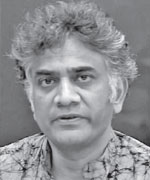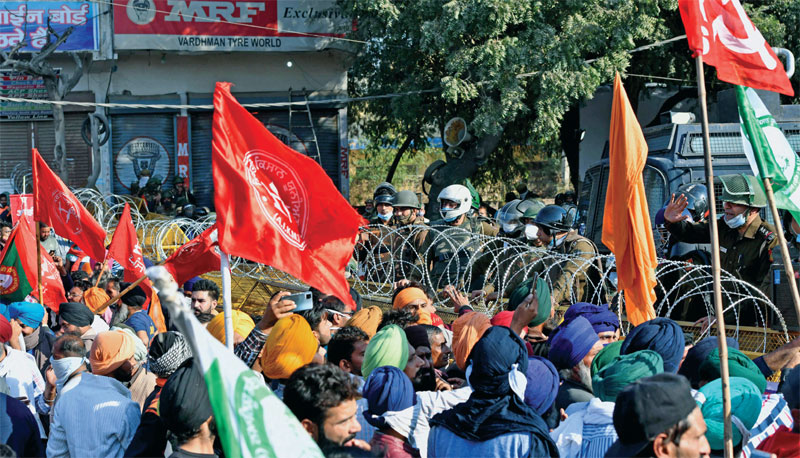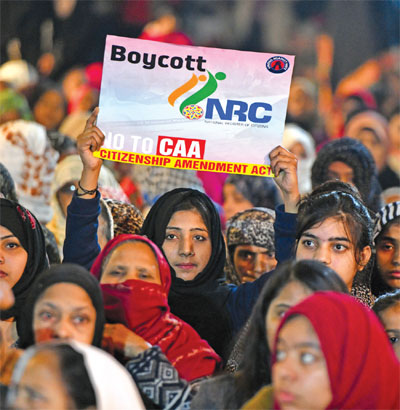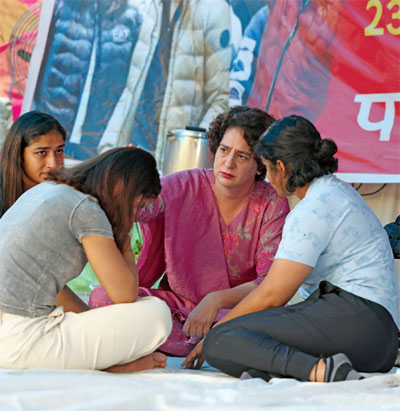Opportunistic politics is creating a serious internal security challenge for the nation
 Aakar Patel
Aakar Patel
In the movie Mad Max Fury Road (2015), the warlord Immortan Joe has a large force of fighters who take pleasure in killing themselves for Joe. They see it as an honour and do so with pride and without hesitation. Before they launch themselves off their vehicles in a kamikaze leap at the opponent, they shout ‘Witness me!’, asking their comrades to observe their sacrifice.
‘Martyr’ is the Greek word for witness. The etymological dictionary says ‘martyr’ means ‘one who bears testimony to faith’ and, especially, ‘one who willingly suffers death rather than surrender his or her religious faith.’ The reference here is to the Christians in the pagan world of Rome a few centuries after the passing of Christ. They were unwilling to integrate into the polytheistic culture of the empire and rigidly held on to their core beliefs, even if that meant being tortured and executed. In the European and Arabic world, the word ‘martyr’ carries similar meaning.
Indians use the Arabic word ‘shaheed’ for martyr. Shaheed also means witness. The Muslim profession of faith (‘la ilaha illaAllah, Muhammadur rasul Allah’) is called the shahada. And so, to be a martyr is to bear testimony, to hold on to what one believes is the truth.
The journalist Gauri Lankesh was 55 in 2017 when she was killed by a man who waited for her outside her home in Bangalore. His face was covered by a helmet. He pulled out a handgun and shot her three times, the same number of rounds that entered another martyr on 30 January 1948. The cameras that Lankesh had installed, because she had known for some time that she was in mortal danger, captured the assassination. The trial to punish her killers continues.
An activist is defined as ‘one who advocates a doctrine of direct action’. The word ‘activist’, as we use it today, is quite recent and goes back only a century, to 1915 (also the year that Gandhi arrived from South Africa). It refers to Swedes who wanted their nation to give up its neutrality in World War I and side with Germany and Austria-Hungary against the Allies, France and Britain, and later the United States. Lankesh was not killed because she advocated direct action. She died because she bore witness.

No Room for Dissent
She came from a community called the Lingayats. This is a group of people whose origins go back about 800 years to a man who rejected caste and formed a sect. This group had factions, including some who adhered to the idea that the rejection of caste meant a rejection of the faith, and others who saw the community as part of the wider Hindu fold. Lankesh began to publish material that angered this latter group. The material was pulled from the community’s own sources and so was not the product of her opinion. And it is also the case that the community had within itself developed fractures, with some sides emphasizing exactly what she was saying. For instance, in the demand that the Lingayats be recognized as a minority and therefore be allowed to run their own institutions.
But faith is ossified in India and what she wrote and published became intolerable. It should be said here that politically, the Lingayat community has been solidly behind the Bharatiya Janta Party (BJP) for the last few decades. Any attempt to examine it rationally would result in a political backlash from the followers of Hindutva. This was also discovered by another individual who had worked on Lingayat literature for several years and was killed two years before Lankesh.
In 1989, following threats from the community against his writing examining some of the primary Lingayat texts, this man, M.M. Kalburgi, recanted. This was the same year that Ayatollah Khomeini had issued a fatwa against Salman Rushdie and, reading the interviews and media coverage of the threats received by Kalburgi, it appears that India was more open to discussing such things then than it is today. Unable to carry on his work, Kalburgi said, ‘I did it to save the lives of my family. But I also committed intellectual suicide on that day.’
Actually, he did not. ‘I will never again pursue any research on Lingayat literature and Basava philosophy,’ he said, but he continued along his intellectual path. He was killed on 30 August 2015, by the same man, according to the police, who murdered Lankesh.
Two other independent thinkers and writers were martyred in our time because of their desire to hold on to the truth. One was Govind Pansare, a Marxist who wrote several books, most famously on Shivaji. This historical and factual portrayal offended those who insisted that the Maratha warrior only be seen in one light. Pansare was shot on 25 February 2015 near his house in Kolhapur by assailants on a motorcycle.
Two years before that, in August 2013, the rationalist and physician Narendra Dabholkar was shot by assailants on a motorcycle in Pune while he was out for his morning walk. ‘If I have to take police protection in my own country from my own people, then there is something wrong with me,’ an obituary in the Times of India quoted him as saying, ‘I’m fighting within the framework of the Indian Constitution and it is not against anyone, but for everyone.’
This is the spirit that informs all four of the people profiled here. They believed they were not doing anything wrong and that what they did was absolutely within the framework of the Constitution to further freedom and inquiry.
The four also through their martyrdoms have warned us that we are not passing through normal times. And in the absence of voices like theirs we will continue to drift further down the waters we have chosen to take.
Mob Rules
Post 2014, India has been defined by its descent into majoritarianism. A few things are important to note here. First, that this is not entirely new. It is not the case that before 2014 India was not inclined to going after its marginalized communities, and especially its religious minorities. The history of communal violence in India and the role of the State make it clear that there is more continuity than change.
The second thing is that the shift is particularly about the inclination of the state, meaning the apparatus of government. Even if we were to concede, as we must, that the past was quite imperfect, we have to still acknowledge that the present is a departure. The ideology of the Bharatiya Janata Party, which is referred to as Hindutva, is defined by its targeting of minorities. It pushes not for laws or policy aimed at Hindus or their reform but at minorities and their brutalization and continued marginalisation.
This targeting has shown itself in the functioning of government and, more disappointingly, it appears to have permeated through into society and media in a way which it had previously not. And in a way which will be difficult to eradicate or even counter without monumental effort.
To the outsider, the facts are clear. India has chosen to go down this path of exclusion and persecution. Meaning that at the moment there is little or no desire to correct the direction. There is no acknowledgement that there is even a problem. Indeed, there seems to be a sense among many that this is where we should permanently be: a hostile and divided nation that is eating itself.
The exclusion referred to manifests itself through the removal of Muslims from democratic politics. Whereas once the tone and tenor of the Constitution and of political parties in general was inclusion, today it is the opposite. Of course, once again, this inclusion of the past was certainly not perfect and often not even necessarily showing itself in practice, but the language was most often pluralist. It was what many of us identified as being the real India.
This desire to be more inclusive has ended under the BJP. The largest political force in the country and the party in control of the government of India has deliberately chosen to not have any Muslim ministers, any Muslim MPs in either house as of July 2022, and no Muslims among its over 1,000 MLAs across India. This has never before happened.
Even if merely for the sake of tokenism, there was representation given to communities in India and particularly, the largest religious minority. What the BJP’s political dominance and desire to exclude has resulted in is that today a set of Indians, numbering the same as the collective populations of Germany, France, and the United Kingdom, is unrepresented in the Union government.
What is the purpose of this exclusion? There is no such theory in Hindutva. It is exclusion for the sake of it and there is no particular end, only more of the same. The most popular political party in India says it wants no truck with Muslims and that is that. This is the political exclusion aspect of post-2014 India.
The second aspect is the persecution. This again has come in a fashion so naked so as to be as immediately apparent as the exclusion. A series of laws targeting Muslims have come to India post 2014. In 2015, after being encouraged by the prime minister against what he called the ‘pink revolution’, two BJP states, first Maharashtra and then Haryana criminalized the possession of beef. In Gujarat, the punishment for cow slaughter, which is ostensibly an economy crime, now attracts life imprisonment. No white-collar crime attracts the same punishment of course. The burden of proof has been reversed in these laws, and it is incumbent on the accused to prove innocence. The reason for this is to make bail difficult and convictions easy to secure. The overriding desire is to ensure that those accused, mostly Muslims, can be brutalized.
In 2019, a Muslim man in Gujarat was accused of serving beef at this daughter’s wedding. The police could not prove that the meat that had been consumed weeks ago was beef. The court convicted him nonetheless saying that it was for him to prove that no crime had been committed. The high court later suspended the sentence, using ‘judicial discretion’, but the law is clear: Muslims accused of beef possession are guilty until proven innocent, reversing the cornerstone of common law, the idea that the accused is assumed to be innocent, and it is for the State to prove guilt.
Interfaith marriage between Hindus and Muslims was criminalized in BJP-ruled states beginning in 2018. Again, the burden of proof was reversed. The testimony of an adult Indian woman that she converted of free volition is insufficient evidence for the state. It is for the man she is marrying and the family she is marrying into to prove that there was no ‘coercion’. This is to be proved to the collector or district magistrate. The state has the power to undo marriages, including those which have children. There has been almost no political resistance to the legislating of these laws. It has only been the activists who have tried to resist their passing and even in an otherwise free media such laws have received no meaningful pushback.
India’s Citizenship Amendment Act specifically targets Muslims in two ways. First, it denies them the same rights as non-Muslims to seek asylum in India, a violation of Article 14. Secondly, it is to be read in conjunction, according to India’s home minister, with the National Register of Citizens. The two pincers will extricate non-Muslims from the trap and leave Muslims to face nationwide what people in Assam have faced under the NRC. The brave protest against the CAA, led by Muslims and especially Muslim women, has ensured that the government backed off from implementing the law on the ground, but it remains on the books.
Other laws—in 2019 criminalizing a form of Muslim divorce, which was already held invalid; in 2020 tightening the forcible ghettoization of Muslims in Gujarat’s cities—continue.
The final aspect of this direction, final in the sense that this is the entering of the most dangerous phase, is that of permeation in society and media. In the past few years, we have seen Muslims being blamed for the spread of Covid, being jailed for the Delhi pogrom of which they were also victims, being denied the right to vend and operate their shops near temples.

In the national capital region, lakhs of migrant Muslim workers had no access to a mosque. They petitioned the state to get access to public land on a Friday for congregational prayer. This continued until it was vetoed by the mob, which showed up week after week till it bullied the state into withdrawing permission.
This is the stage we have reached in India. The state itself has abandoned one of the cardinal principles of modern government: that the State monopolizes violence and is the only authorized wielder of the use of force. By succumbing to mobs and their threats, the State has given up part of its legitimacy.
The genie has escaped the bottle and things will get worse from here. We will be more divided, more segregated, more violent, and a more unequal society which will remain poor.
Resist and Remain Engaged
Is there an antidote to this? There is. Is there something the individual can do? There is. We cannot solve problems if we do not acknowledge that they even exist. Only after we accept that there is an issue, can we bring ourselves to considering how to address it.
Fact-finding is but the first step in the process towards justice and equality. Once the facts have been established, civilized societies accept them and do the right thing. This is less easy in our part of the world because facts and even numbers can and will be refuted with rhetorical argument. The correct thing to do, particularly for the state, would be to recognize that a wrong has been done, and has been condoned by it. And then to move to correct it. Till such time as we arrive at such a state in India, we must do what we can to put the evidence out.
The People’s Union for Civil Liberties was founded by Jayaprakash Narayan to try and resist the excesses of the state during the Emergency. It continues to do this in our time, when the attack on liberties is more brazen, more widespread, and more lethal to the people of this nation.
When Muslim girls from Karnataka were prohibited from covering their heads in schools and colleges, the focus of the media and the government was towards uniformity over individual rights. The focus of the judiciary was on what it has come to call essential religious practices rather than freedom of choice. What was required in the first instance, and this was what PUCL did, was to examine what the impact of the hijab ban was on the students. This, after months of gathering evidence, the organization (of which I am member) did in early 2023.
The report, which is available on the PUCL Karnataka’s website, makes for sobering reading. Not only for what it reveals about the impact on the students and their families and the people around them, but also the role of the government and its elements in quickening, often with enthusiasm, the attack on the girls and women.
The object of such exercises is also the communication of solidarity. In a part of the world where voting is along confessional lines and group identity is as and perhaps more important than individual identity, it is vital that empathy be on display. Those suffering under tyranny must know that their anguish is understood. The report opens with the words:
‘PUCL-Karnataka acknowledges the hardships endured and the struggles waged by Muslim women across the state. Their fearlessness is visible in the various ways in which they have resisted and demanded for their fundamental rights to be upheld.’

Similarly, when the Christians of Karnataka came under sustained attack in 2021, as have their brethren across the country for several years now, the first order of business was to document what was happening to them.
This was, of course, not how it had been described in the media, a series of individual episodes each justified or justifiable. It was a campaign of hatred that violently blocked the exercise of fundamental rights, including praying in one’s homes and one’s churches, by a mob with whom the police were aligned.
This report also makes for sobering reading for anyone who claims they want this nation to progress and develop. And also, for those who seek to know what it is that they can, at this point in time in India’s history, do. First, we have to arm ourselves with information.
It doesn’t matter that we think that the political system and perhaps even the judiciary are incapable to stop or slow down what is happening. The Constitution empowers us to engage with the state in more ways than just through voting. Free speech, peaceful assembly, and freedom of association remain fundamental rights in India. However, curbed they may be, they exist. The media, even though choosing to be craven, is free and can be influenced. The judiciary is unfettered and while the perception might be otherwise it operates theoretically in purely Constitutional fashion to protect individual rights. How can we best make use of this environment? We draw inspiration from our martyrs.
What Lankesh and the three men did was to try and get the rest of us to acknowledge that there was a problem. They bore witness.

